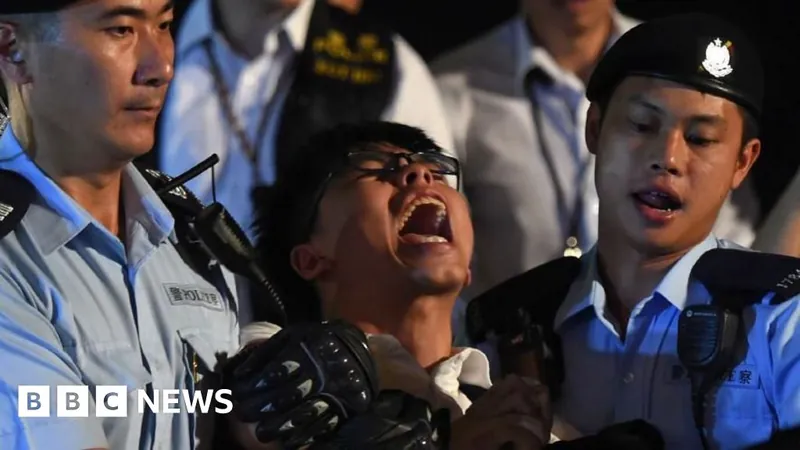
Major Crackdown: Hong Kong's Pro-Democracy Leaders Sentenced to Long Prison Terms
2024-11-19
Author: Chun
In a significant escalation of the crackdown on dissent, a Hong Kong court has sentenced 45 prominent pro-democracy activists to lengthy prison terms under the controversial national security law (NSL). This unprecedented trial attracted massive public interest, with many Hongkongers lining up outside the courtroom days in advance to witness the proceedings.
Among the most notable sentences, Benny Tai, an influential figure who spearheaded the initiative for an unofficial primary election in 2020, received a staggering 10 years in prison. Meanwhile, Joshua Wong, a well-known activist and outspoken critic of Beijing, was handed a sentence of over four years. The convictions were a part of a broader case involving the so-called "Hong Kong 47," which includes a mix of lawmakers and activists who sought to foster opposition in local elections.
This trial represents the largest case conducted under the draconian NSL, which was enacted in June 2020 after a wave of massive pro-democracy demonstrations swept the city in 2019. These protests initially erupted in response to a proposed legislation that would have allowed for extraditions to mainland China. However, they quickly evolved into a larger movement demanding democratic reforms and greater autonomy from Beijing's stringent controls.
The results of the trial have alarmed international observers, with critics arguing that the NSL and subsequent sentencing of the activists represent a significant blow to Hong Kong's civil liberties and the rule of law. The United States has openly condemned the trial as politically motivated, while Australia expressed deep concerns over the treatment of one of its citizens, Gordon Ng, who was also convicted in this case.
Emily Lau, former chair of Hong Kong's Democratic Party, highlighted the chilling atmosphere surrounding the activism climate in Hong Kong, noting that the fear of arrest under the NSL has paralyzed even private gatherings among pro-democracy supporters. "It's stressful; we could not even organize a dinner party for members and friends," she said during a BBC interview.
Western leaders continue to voice their dissent against the actions of Hong Kong and Beijing officials. UK Prime Minister Keir Starmer directly addressed the case of jailed billionaire activist Jimmy Lai during discussions with Chinese President Xi Jinping at the recent G20 summit, raising awareness of the plight of political prisoners in Hong Kong.
In stark contrast, the Hong Kong government, backed by Beijing, defends the NSL as vital for ensuring stability in the region. They claim these convictions send a clear message to those attempting to undermine national security. "No one can engage in illegal activities in the name of democracy and attempt to escape justice," a representative for China’s foreign ministry declared.
The repercussions of this trial are being felt acutely among activists, many of whom are now forced to operate under severe self-censorship. As noted by scholar John P. Burns from the University of Hong Kong, the outcomes serve not only to punish dissenters but also to reshape the political landscape in a manner that discourages future opposition to Beijing's authority.
The pro-democracy movement, once a vigorous force advocating for the rights and freedoms of Hongkongers, now finds itself severely weakened as hopes for reform slowly diminish. Activists including Ted Hui, who fled to Australia after the crackdown, lament the loss of momentum and express concerns that while Beijing may seem victorious in quelling opposition, it has lost the trust of an entire generation.
As Hong Kong continues to navigate this tumultuous era, the struggle for democracy remains ongoing — albeit under increasingly dire and oppressive circumstances. Will the spirit of the pro-democracy fighters endure? Only time will tell as the world watches closely.

 Brasil (PT)
Brasil (PT)
 Canada (EN)
Canada (EN)
 Chile (ES)
Chile (ES)
 España (ES)
España (ES)
 France (FR)
France (FR)
 Hong Kong (EN)
Hong Kong (EN)
 Italia (IT)
Italia (IT)
 日本 (JA)
日本 (JA)
 Magyarország (HU)
Magyarország (HU)
 Norge (NO)
Norge (NO)
 Polska (PL)
Polska (PL)
 Schweiz (DE)
Schweiz (DE)
 Singapore (EN)
Singapore (EN)
 Sverige (SV)
Sverige (SV)
 Suomi (FI)
Suomi (FI)
 Türkiye (TR)
Türkiye (TR)